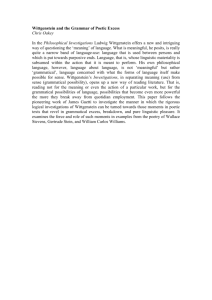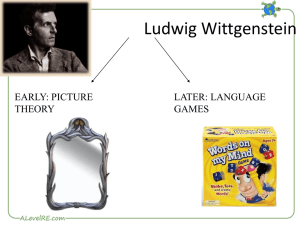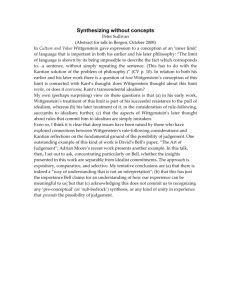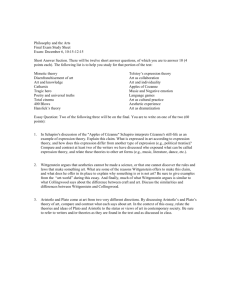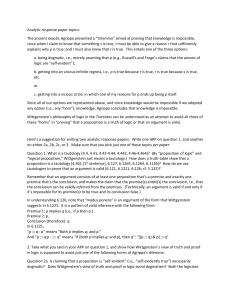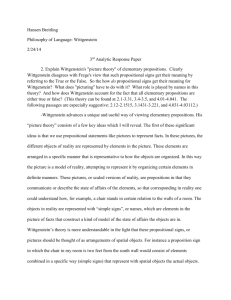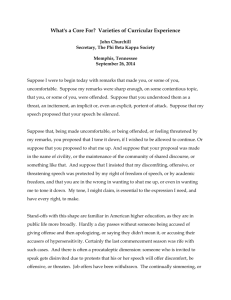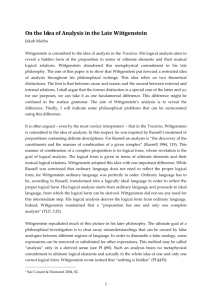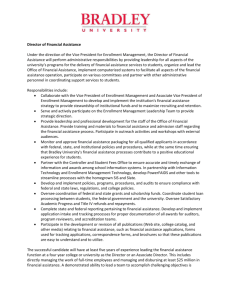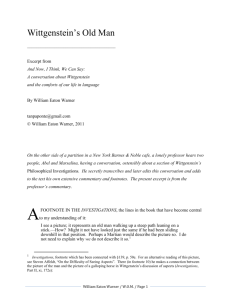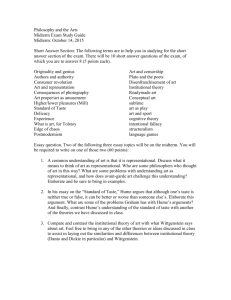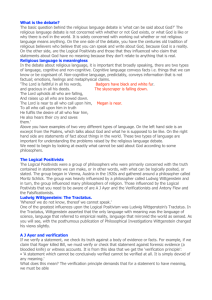objects linguists
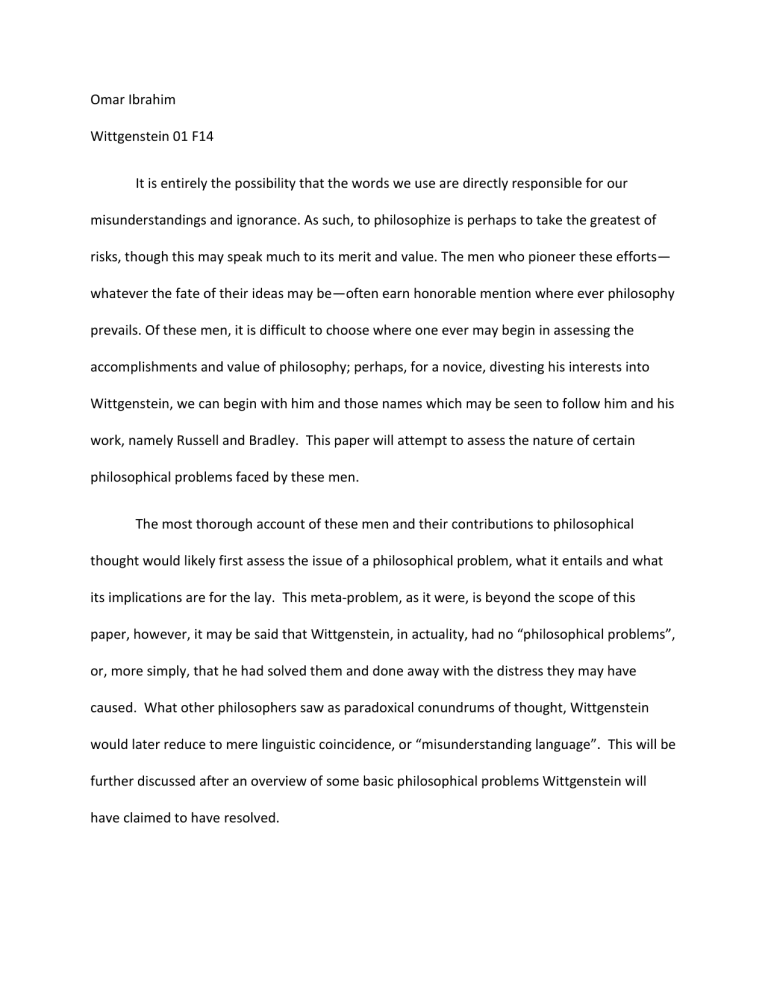
Omar Ibrahim
Wittgenstein 01 F14
It is entirely the possibility that the words we use are directly responsible for our misunderstandings and ignorance. As such, to philosophize is perhaps to take the greatest of risks, though this may speak much to its merit and value. The men who pioneer these efforts— whatever the fate of their ideas may be—often earn honorable mention where ever philosophy prevails. Of these men, it is difficult to choose where one ever may begin in assessing the accomplishments and value of philosophy; perhaps, for a novice, divesting his interests into
Wittgenstein, we can begin with him and those names which may be seen to follow him and his work, namely Russell and Bradley. This paper will attempt to assess the nature of certain philosophical problems faced by these men.
The most thorough account of these men and their contributions to philosophical thought would likely first assess the issue of a philosophical problem, what it entails and what its implications are for the lay. This meta-problem, as it were, is beyond the scope of this paper, however, it may be said that Wittgenstein, in actuality, had no “philosophical problems”, or, more simply, that he had solved them and done away with the distress they may have caused. What other philosophers saw as paradoxical conundrums of thought, Wittgenstein would later reduce to mere linguistic coincidence, or “misunderstanding language”. This will be further discussed after an overview of some basic philosophical problems Wittgenstein will have claimed to have resolved.
The least obvious of all philosophical problems is likely what Bertrand Russell had termed the “unity of the proposition”, at least, for other than the philosopher to contemplate. The nature of this problem was not new to the world and can likely be traced by to the beginnings of philosophy. In perhaps the simplest and least analytical sense, we can say that this is a problem of connectivity, or “sense-making”. Somewhat more elaborately, we can ask the question: what relation exists between the constituents of a proposition? To describe this problem without relying on knowledge of language and grammar is difficult—even the word "proposition" is misleading as if bearing an obvious referent other than manifest in language—and it is precisely this difficulty which will guide Wittgenstein throughout his
Tractatus. This problem is traditionally illustrated by relying heavily on language and using sentences to attempt to illustrate the inherent problem, or opacity of sentences. This is what
Wittgenstein will largely take issue with, although his solution is likely more complex than is warranted. In a very abstracted, and perhaps, existential sense we might ask how it is possible that multiple things can be, together, made true or false. That is, how do we know the difference between an arbitrary collection of items with no relation to each other, and a meaningful collection (or list) of items which are necessarily related to each other—whether they are names, objects, concepts, or otherwise.
Using limited linguistic knowledge allows for a more precise description of this problem of the unity of the proposition. Most simply, we can ask how do we know that the constituents of a sentence—names and predicates, subjects and objects, agents and actions, and the like— are in fact related to each other. This seems to be more a task for the linguist, one that metaphysicians might have taken too seriously. In other words, they might say, what makes a
sentence like “the sky is blue” acceptable and meaningful, while merely stating the words
“blue” and “sky” is unacceptable, (as though its color would change at the utterance). Some linguists might simply respond "rules", but these days many might say violable constraints. (see
Optimality Theory)
Francis Herbert Bradley had taken this dilemma even further, and so, his name would then earn the colloquialism which refers to this problem and is commonly known as Bradley’s
Regress. Instead of tackling the greater (or, perhaps smaller) issue of attempting to unify everything in a proposition, Bradley concerned himself with how any two things could possibly be related. Bradley would further postulate that attempting to establish a relation between any two things necessarily leads to an infinite regress. For example, if we borrow Russell’s teapot and say “the teapot orbits the sun”, Bradley might argue that, regardless of whether or not this statement is true (as it does not seem he is entirely concerned with truth) in order for there to be a relation between the teapot, orbiting and the sun, their existence alone is insufficient. (At this point, any layperson who understood the gravity of Bradley’s doubt and might have questioned his sanity, though such is the length much of philosophy will go, and this is a fair warning all deserve.) There needs to be a relation between the teapot and the orbiting, perhaps that teapots can orbit, and subsequently a relation between that (relation) and the orbiting, perhaps, again, that teapots can orbit and that orbiting can be attributed to them, and then, once again, a relation that this (previous) relation can be attributed to either, and so on. (This reasoning is not altogether intuitive and seems to weigh the notion of relation, or relations themselves in a particularly strange fashion, as though it bears some kind of manifestation other than a logical or cognitive process.)
Needless to say, such a problem, were it in fact a true problem, poses very serious consequences, namely, the conclusion that relations themselves cannot not exist. The seriousness of this claim, is multiplied by the very fact that Bradley relies upon relations to make his argument. In some sense, one might simply say that Bradley’s argument is selfrefuting, (if not disturbed). On the other hand, it might appease the theist who seeks to answer every question with "god", though even the theist might find little use in declaring such a power of god.
Wittgenstein, in any case, does seem to entertain these problems of connectivity or relation. To answer the question of how a proposition is unified Wittgenstein might simply have said: it just is. The collection of things which seemed to have caused Russell and Bradley, among others, such grief Wittgenstein refers to as sachverhalt, or a “state of affairs” or “things”
(2.01). Alternatively, this is translated as “atomic fact” which preserves some of the German etymology where there are linguistically intrinsic relations with the morpheme sache, which signifies a “thing” or “object”, and the word tatsache, “fact”. It is these intrinsic etymological relations which may have aided Wittgenstein, at least in his writing 1 . Within this atomic fact, things “hang in one another, like the links of a chain” (2.03), in other words they do not require anything to connect them to each other. Although, Wittgenstein does not identify any examples of such “things”, nor does he give us any means of doing so, his purpose is beyond this. He builds his case. He has previously told us that “the world is all that is the case”, and
“that the world is the totality of facts, not things” (1, 1.1). Wittgenstein has also told us that
1 I include this here because etymological relations seem to function very much like Wittgenstenian objects; the parts of greater abstracted meanings can be represented through morphological transformations of language.
“what is the case” is, in fact, “a fact” (2) and that “the structure of a fact”, or that which he says is the case, or is the world itself, depends on, or “consists of the structures of atomic facts”. Wittgenstein will continue to say that “the logical picture of the facts", the assumption made about the facts, the plausible world-states we might say, "is the thought” (3) and that it is only “the thought” itself “which is the significant proposition” (4). Though this may mark
Wittgenstein's leap into psychology without permission from later unsatisfied epistemologists, it, the proposition (the thought) is unified because it is thought. In this way, Wittgenstein unifies the constituents of (significant) propositions (within the mind, at least, thought they have no other meaningful referent) and avoids Bradley’s Regress by developing a logical model wherein relations themselves are indeterminate, or more simply, unquantifiable and unnecessary.
Similar responses to Russell and Bradley might echo the sentiments of an extreme pragmatism which would do away with semantics altogether, in that there need be no actual relation between (any) things at all, but that, in order to communicate, we pretend there are, or agree that there are, so as to facilitate felicitous interaction, whatever that may be for one. Wittgenstein will continue to give an account of language which will undermine previous philosophical propositions and questions as “nonsensical” and merely a result of philosophers failing “to understand the logic of language” (4.003). At the very least, all that such philosophy might do for us is offer insight into the mind’s workings, providing a “clarification of propositions”. (4.112)
Relations themselves perhaps bear some more consideration. It would seem that their parent manifestation is biological or hereditary and so likely psychological. That is, taken for
granted in its primitivism and essentially assumed, or, at least, no more than sensed, on the one hand. On the other, it may seem that things bear intrinsic associations with other things. In
Wittgensteinian terms, we might say that things, or objects "know" where they belong with respect to other objects in their logical space, perhaps, through bearing some intrinsic property
(quantum entanglement?) or even sense. Though, this last sense might only the futurist who is interested in confirmation bias or collective consciousness than it would the philosopher, at this point. The linguistic notion of transitivity may lend to this; semantically we might say that meaning "moves" from one point of focus to another, or, it does not, while pragmatically we recognize there to be "relations" and properties, or qualities. Moreover, if we wish to disregard the notion of relation altogether we may do so be also disregarding the notion of time. This is to say that all things in existence essentially function like Wittgensteinian objects, that all things simply are, and our perception of time or continuity is merely a byproduct of our incapacity for true and complete knowledge or sense. In perhaps less palatable words: the world is only as a god would see it, though we may retain our various languages.
